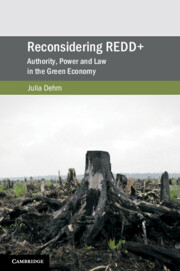Book contents
- Reconsidering REDD+
- Cambridge Studies on Environment, Energy and Natural Resources Governance
- Reconsidering REDD+
- Copyright page
- Contents
- Acknowledgements
- Abbreviations
- Introduction
- 1 Background to REDD+
- 2 Asserting Global Authority over the Carbon Sequestration Potential of Forests
- 3 Actualising Authority through Public and Private Law
- 4 Responsibility and Capacity
- 5 Scale, Multilevel Governance and the Disaggregation of Property Rights in REDD+
- 6 REDD+ at the ‘Local’ Level
- 7 Conclusion
- Bibliography
- Index
1 - Background to REDD+
Published online by Cambridge University Press: 13 May 2021
- Reconsidering REDD+
- Cambridge Studies on Environment, Energy and Natural Resources Governance
- Reconsidering REDD+
- Copyright page
- Contents
- Acknowledgements
- Abbreviations
- Introduction
- 1 Background to REDD+
- 2 Asserting Global Authority over the Carbon Sequestration Potential of Forests
- 3 Actualising Authority through Public and Private Law
- 4 Responsibility and Capacity
- 5 Scale, Multilevel Governance and the Disaggregation of Property Rights in REDD+
- 6 REDD+ at the ‘Local’ Level
- 7 Conclusion
- Bibliography
- Index
Summary
This chapter provides a background to and analysis of REDD+ from multiple angles and across a number of different registers. Firstly, it traces the history of REDD+ as a legal agreement that provides the framework through which activities to address deforestation and forest degradation can be measured, reported and verified as ‘result-based action’ and made legible in the rubric of one tonne of carbon dioxide equivalent. Secondly, this chapter examines REDD+ as constituted through experimental practices, preparatory and market-construction activities. Thirdly, it analyses REDD+ as a concept or idea arising from the field of environmental economics, namely, that forest protection can be ‘incentivised’ through the financial valuation of nature and payment for environmental services schemes, including potentially the inclusion of forests in international carbon markets. Fourthly, it provides an overview of the activities that are promoted through REDD+ and interrogates the history of both conservation and sustainable forest management. Finally, it outlines how the scope of REDD+ programmes and projects has extended beyond its initial environmental focus, so that REDD+ has now also become a social project concerned with ‘co-benefits’ such as poverty alleviation, tenure reform and rights for people living in and around forested areas.
Keywords
- Type
- Chapter
- Information
- Reconsidering REDD+Authority, Power and Law in the Green Economy, pp. 59 - 121Publisher: Cambridge University PressPrint publication year: 2021

